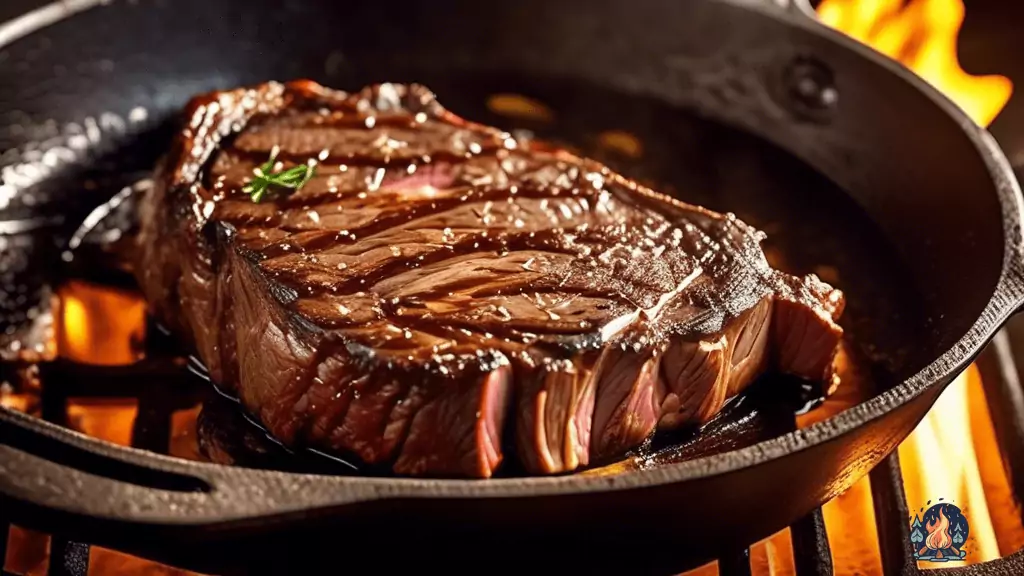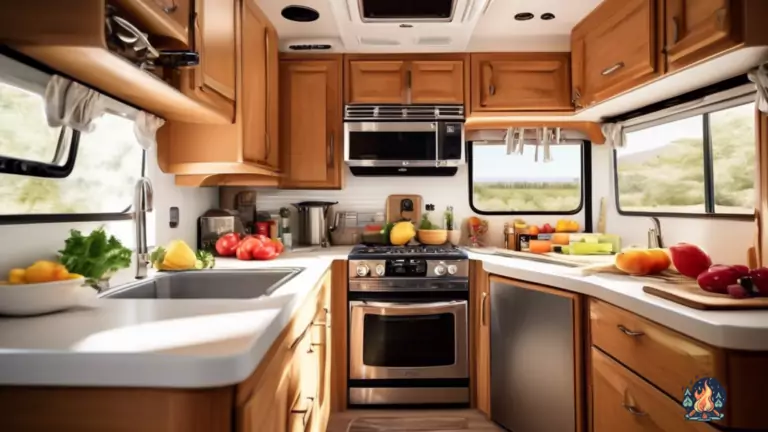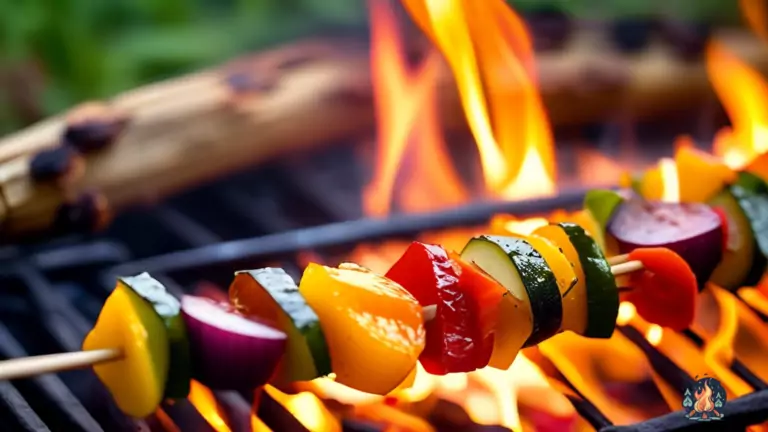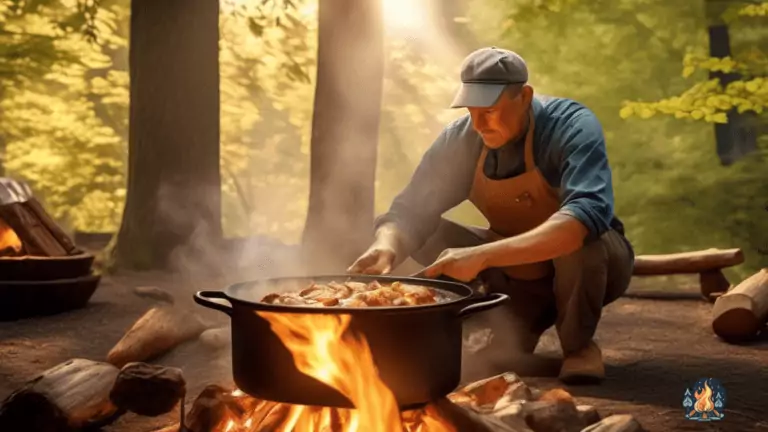Cooking With Cast Iron Skillets: Tips And Techniques
by Kevin Fairbanks • Updated: January 30, 2024
Learn expert tips and techniques for cooking with cast iron skillets. From seasoning to searing, elevate your meals with the versatility of these pans. Click now to become a cast iron cooking pro!

Are you tired of your non-stick pans letting you down? Do you yearn for a cooking experience that is durable, versatile, and downright magical?
Well, my friend, it’s time to introduce you to the world of cooking with cast iron skillets! These trusty kitchen companions have been around for centuries, and for good reason. In this article, we’ll dive into the wonderful world of cast iron cooking, sharing tips and techniques that will have you whipping up delicious meals like a seasoned pro.
So grab your apron and prepare to embark on a culinary adventure like no other!
Now, before we get started, let’s talk about the importance of choosing the right cast iron skillet. You see, not all skillets are created equal. Just like finding the perfect partner, you want to ensure a skillet that’s the right fit for you.
Size matters, my friend! Whether you’re cooking for a small army or just for yourself, there’s a cast iron skillet out there with your name on it. And don’t be fooled by those shiny, new skillets either.
The real magic lies in vintage cast iron, those battle-tested beauties that have stood the test of time. So, channel your inner treasure hunter and start scouring garage sales and thrift stores for your very own culinary treasure.
Trust me, the rewards will be deliciously worth it!
Key Takeaways
- Cast iron skillets create a crispy crust and moist interior in food.
- They add flavor and character to dishes.
- Cast iron skillets are versatile and can be used for searing, frying, and baking.
- Preheating the skillet in the oven before use enhances cooking results.
Choosing the Right Cast Iron Skillet
Now that you’ve mastered the basics of cooking with cast iron skillets, it’s time to choose the perfect one that will be your culinary companion for years to come, like a loyal friend who always brings out the best in your recipes.
When it comes to selecting the right cast iron skillet, there are a few things to consider. First and foremost, size matters! You don’t want a skillet that’s too small, leaving you with cramped cooking space, or one that’s too big, making it difficult to handle. Find that sweet spot where you can comfortably cook a hearty meal for yourself or a few hungry guests without feeling overwhelmed or underwhelmed.
Another important factor to consider is the handle. You want a skillet with a sturdy handle that feels comfortable in your hand. After all, you’ll be flipping, sautéing, and tossing your ingredients with gusto, and you don’t want your trusty skillet slipping out of your grasp mid-cook. Look for a skillet with a handle that stays cool to the touch, so you can confidently maneuver it without the risk of burning yourself.
And let’s not forget about aesthetics! Cooking is an art, and your cast iron skillet is your paintbrush. Choose a skillet that speaks to your personal style and makes you excited to step into the kitchen. Whether it’s a vibrant color or a sleek design, let your skillet be an extension of your culinary creativity.
So go forth, my friend, and find that perfect cast iron skillet that will be your partner in deliciousness. Happy cooking!
Seasoning and Maintaining Your Skillet
To ensure optimal performance and longevity, it’s essential to properly season and maintain your skillet. Here are a few tips to keep your cast iron skillet in top-notch condition:
- Season it like a boss: Seasoning your skillet is like giving it a protective shield against rust and sticking. Start by preheating your oven to 350°F (175°C) and giving your skillet a thorough cleaning with hot water and a stiff brush. Once dry, apply a thin layer of vegetable oil or shortening all over the skillet, including the handle. Place the skillet upside down on the oven rack and bake it for an hour. Voila! Your skillet is now seasoned and ready to go.
- Handle with care: Cast iron skillets may be tough, but they still need some TLC. Avoid using metal utensils that can scratch the seasoning. Opt for wooden or silicone utensils instead. Also, never soak your skillet in water or put it in the dishwasher. Instead, hand wash it with hot water and a gentle brush. Dry it thoroughly to prevent any moisture from causing rust.
- Show it some love: Cast iron skillets love a little pampering. After each use, give it a quick wipe with a paper towel or a cloth to remove any food residue. If you’re dealing with stubborn stuck-on bits, add a little salt and scrub it with a soft brush. This will help to maintain the seasoning and prevent any funky flavors from transferring to your next meal.
- Keep it oiled up: To keep your skillet happy and rust-free, it’s important to give it a light coating of oil after each use. Simply rub a small amount of oil all over the skillet, including the handle, and store it in a dry place. This will help to maintain the seasoning and ensure that your skillet is always ready for its next culinary adventure.
Remember, a well-seasoned and well-maintained cast iron skillet is like a trusty sidekick in the kitchen. With a little love and attention, it’ll serve you faithfully for years to come. So go ahead, whip up some delicious meals, and let your cast iron skillet shine!
Cooking with High Heat
For an elevated cooking experience, crank up the heat and let your cast iron skillet work its magic.
Cast iron skillets are like the superheroes of the kitchen – they can handle extreme heat like no other pan out there. So, don’t be afraid to turn up the dial and let the flames dance around your skillet.
Just make sure your smoke detector is on standby, because things are about to get hot!
When cooking with high heat, it’s important to preheat your cast iron skillet properly. You want it to be smoking hot, just like that scene in your favorite action movie.
Heat it up on medium-high heat for a few minutes until it starts to sizzle and smoke. Now, it’s showtime!
Throw in your ingredients and watch them sizzle and sear to perfection. The high heat will give your food a delicious char and a crispy exterior that will make your taste buds do a happy dance.
But remember, with great power comes great responsibility. High heat can be a double-edged sword, so you need to stay vigilant.
Keep an eye on your food and be ready to flip, stir, or remove it from the heat if things start to go south. And don’t forget to protect yourself – a long-handled spatula and a trusty oven mitt will be your best friends in this high-stakes cooking adventure.
So, go ahead and unleash the heat in your cast iron skillet. Let it work its magic and take your cooking to the next level.
Just be prepared for the smoky drama and the mouthwatering results that will have you coming back for seconds, and maybe even thirds.
Happy cooking!
Cleaning and Care Tips
Regularly maintaining your trusty cast iron pan is crucial for its longevity and lustrous appearance.
Cleaning your cast iron skillet may seem like a daunting task, but fear not! With these simple tips, you’ll have your pan looking brand new in no time.
First and foremost, never, I repeat, NEVER use soap on your cast iron pan. Soap is the enemy of cast iron and will strip away all the seasoning that you’ve worked so hard to build up. Instead, opt for a gentle scrub with a brush or sponge and hot water. Give it a good rinse and pat it dry with a towel, making sure to remove all the moisture to prevent rust.
Now, let’s talk about the stubborn food residue that just won’t budge. You know, that stubborn piece of bacon that got a little too cozy with your pan? Fear not, my friend!
Pour some coarse salt onto your pan and use a paper towel to scrub away the residue. The salt acts as a natural abrasive, helping to remove any stuck-on bits without damaging the surface of your pan. Once you’ve scrubbed away the residue, wipe it clean with a damp cloth and give it a final wipe with a little bit of oil to keep it seasoned and protected.
Remember, a well-maintained cast iron skillet is a happy cast iron skillet, and a happy cast iron skillet means delicious meals for years to come!
How can I use my cast iron skillet for campfire cooking?
When it comes to campfire cooking, your flavorful cast iron skillet recipes will shine. Use it to cook everything from hearty breakfast scrambles to juicy steaks and even gooey skillet desserts. The durability and even heat distribution of your cast iron skillet make it an essential tool for outdoor cooking.
Exploring Different Cooking Techniques
Let’s dive into the various methods for using cast iron skillets in the kitchen! Cast iron skillets are incredibly versatile and can be used for a wide range of cooking techniques.
Here are three fun and delicious ways to make the most of your cast iron skillet:
- Searing: Nothing beats the satisfying sizzle of a perfectly seared steak in a cast iron skillet. The high heat retention of cast iron allows you to get a beautiful, caramelized crust on your meat while locking in all the juicy flavors. Just heat up your skillet, add a little oil, and sear your steak on each side until it’s nicely browned. You can also use this technique for other meats like chicken or pork chops.
- Frying: Whether you’re making crispy fried chicken or golden French fries, a cast iron skillet is a game-changer for frying. The even heat distribution of cast iron ensures that your food cooks evenly and gets that perfect crunch. Plus, the high sides of the skillet help contain any splatters. Just be sure to heat up your oil slowly and monitor the temperature to avoid burning.
- Baking: Yes, you can even bake in your cast iron skillet! From skillet cornbread to gooey chocolate chip cookies, the possibilities are endless. The heat-retentive properties of cast iron create a perfectly crispy crust while keeping the inside moist and tender. So preheat your skillet in the oven, pour in your batter or dough, and watch as magic happens.
So go ahead and let your cast iron skillet take center stage in your kitchen. Whether you’re searing, frying, or baking, these techniques will help you unlock the full potential of this fantastic tool. Plus, the extra flavor and character that a well-seasoned cast iron skillet imparts on your food is just an added bonus.
Happy cooking!
Frequently Asked Questions
Can I use a cast iron skillet on an induction cooktop?
Yes, you can absolutely use a cast iron skillet on an induction cooktop! The magnetic properties of cast iron make it perfect for induction cooking. So go ahead, heat up that skillet and whip up something delicious!
How do I remove burnt-on food from my cast iron skillet?
Can’t get rid of that pesky burnt-on food? No worries! Just grab some coarse salt, a splash of oil, and a trusty spatula. Scrub away the mess and watch your skillet shine like new!
Can I use metal utensils with a cast iron skillet?
Sure, you can totally use metal utensils with your cast iron skillet! Don’t be afraid to get a little rough with it. Just remember, cast iron is tough like a superhero, so it can handle anything you throw at it!
Can I cook acidic foods like tomatoes in a cast iron skillet?
Absolutely! You can totally cook acidic foods like tomatoes in your trusty cast iron skillet. Just make sure you’ve seasoned it well and avoid leaving the food in there for too long. Happy cooking!
How do I prevent my cast iron skillet from rusting?
Want to keep your cast iron skillet rust-free? Just like a knight in shining armor, give it a protective shield! Rub it with a thin layer of oil after each use to keep it rust-free and ready for battle in the kitchen!

Hi, I’m Kevin, a lifelong camping enthusiast and the voice behind Campfire Discoveries. From tent to RV to cabin camping, I’ve explored it all. Join me as we share stories and tips around the campfire, deepening our connection with the great outdoors.
Like This Article?
Share with your friends
Table of Contents
Latest Articles
Keep Reading
-
Quick And Easy RV Cooking Tips For Beginners
Learn the secrets to easy and delicious RV cooking with these beginner-friendly tips. Upgrade your campfire meals now and start cooking up a storm! Get started today.
-
Delicious Campfire Cooking Vegetarian Recipes
Unleash your inner chef with these scrumptious campfire cooking vegetarian recipes that will leave you craving for more! From hearty mains to irresistible desserts, get ready to elevate your camping experience. Try them out now and satisfy your taste buds like never before!
-
Mastering Dutch Oven Cooking: Campfire Recipes You’ll Love
Learn how to master Dutch oven cooking with these delicious campfire recipes. Indulge in flavors that will leave you craving for more. Try them out today!



